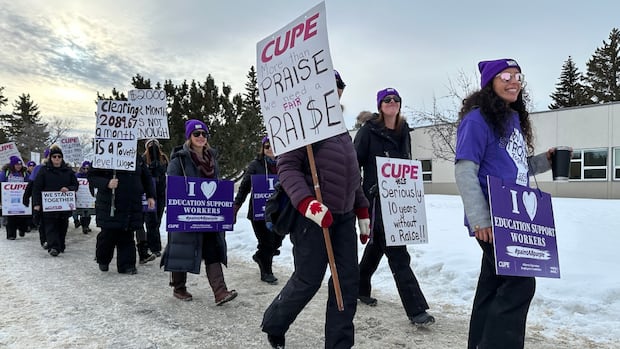
Alberta public sector workers, experts point to provincial interference in collective bargaining
CBC
As thousands of school support workers strike across Alberta, union organizers on the picket line have argued the provincial government could step in to end the strikes.
The province has countered the issue is a local bargaining matter it won't get involved in.
Some labour experts point to provincial legislation that could be interfering with ongoing negotiations between school boards and the Canadian Union of Public Employees (CUPE) in Alberta.
More than 1,100 custodial and maintenance workers from Calgary's two largest school districts, the Calgary Board of Education and Calgary Catholic School District, went on strike this week. They're joined by thousands more education support workers around the province on the picket line.
CUPE Alberta president Rory Gill argued on the picket line on Monday that the province has the resources to step in and provide school districts with enough funding to end the strike but is preventing school boards from negotiating a higher deal with workers than the terms the government has laid out.
Jason Foster, a labour relations professor at Athabasca University, co-authored a Parkland Institute report last year that delved into the province's involvement in collective bargaining with public sector workers. He argues it's unsurprising to see negotiations drag out between CUPE and school boards because employers don't have the authority to get a deal done.
The province created the Public Sector Employers Act in 2019, which allows the finance minister to direct public employers to set terms and spending limits for collective agreements. The province says employers must not publicize which terms are flexible and which are immutable government directives.
This ability for the province to interfere in negotiations, Foster argues, throws bargaining off the rails.
"It becomes impossible for the parties to be able to come up with a deal because the employers have to look over their shoulder at the provincial government, who's imposed this mandate on them that they can't even talk about," Foster said. "They can't even admit at the table that there is a mandate or what the mandate is."
That mandate, Foster said, prevents school boards from negotiating an agreement offering public sector workers more than what the government's mandate lays out. He argued this breaks down trust at the bargaining table.
In a statement Tuesday, the office of the Ministry of Treasury Board and Finance said Alberta's government provides funding to school boards, and school boards negotiate directly with unions, but there are fiscal limits imposed on school boards for collective bargaining under the Public Sector Employers Act.
The province says CUPE is asking for wage increases that far exceed the school boards' ability to pay.
"No one doing this work anywhere in Canada is receiving these types of increases," the province said.
The Calgary Board of Education told CBC News on Tuesday that it respects the bargaining process and is committed to bargaining in good faith with CUPE Local 40 to reach a new agreement.













